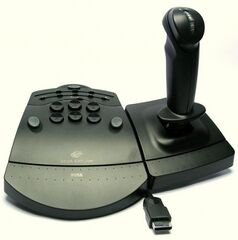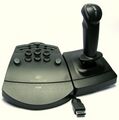Difference between revisions of "Mission Stick"
From Sega Retro
| Line 12: | Line 12: | ||
}} | }} | ||
}} | }} | ||
| − | The '''Sega Mission Stick''', called the '''Analog Mission Stick''' (アナログミッションスティック) in Japan, is an analog stick | + | The '''Sega Mission Stick''', called the '''Analog Mission Stick''' (アナログミッションスティック) in Japan, is an analog flight stick for the [[Sega Saturn]]. |
| − | + | The Mission Stick comes in two parts - a large flat unit featuring the usual Sega Saturn buttons (with turbo features) and a stick unit, complete with trigger buttons and a throttle wheel. The Mission Stick is unique in that it can be "flipped" to suit both left handed and right handed players player - the flat "control panel" unit connects to the Saturn console, but the stick unit is detachable and can be inserted at either side (this connects to the flat unit via a "main control" port located at the base of the unit). The Mission Stick was designed primarily for flight and 3D shooting games, though is compatible with the majority of Saturn software. Like other analog controllers, a switch determines whether the peripheral should function in "analog" or "digitial" mode. | |
| − | + | Like with the [[Arcade Racer Joystick]], most games which support the Mission Stick also work in analog mode on the [[3D Control Pad]], however the throttle wheel on the stick is not supported by other controllers. The throttle wheel is only used in a small number of the games, and in some cases, such as ''[[MechWarrior 2: 31st Century Combat]]'', native 3D Control Pad support avoiding the wheel is still an option. Others such as ''[[Black Fire]]'' are only partially-compatible with the 3D Control Pad in analog mode due to a reliance on the throttle. | |
| − | Because of design differences from the regular [[Control Pad (Saturn)|digital control pad]], not all games will recognize the Mission Stick | + | Interestingly enough, there's an expansion connector on the bottom of the stick labeled "sub control", which was given no official use. However, this can be exploited through a second Mission Stick to access a hidden function of the controller. Mounting two sticks to the control panel at either side, where one uses "main control" and the other "sub control" will create a "twin-stick". Only one game, ''[[Panzer Dragoon Zwei]]'', is known to support that twin-stick mode, and it is important to note that the Mission Stick in twin-stick mode is not compatible with the ''[[Saturn Twin Stick]]'', which is an entirely separate control scheme. |
| + | |||
| + | The Mission Stick was also one of the more expensive Saturn control peripherals, and (as far as Japan goes) very few games supported it, however, most games which support the Arcade Racer Joystick in analog mode will also support the Mission Stick in analog mode. In western markets some games such as ''MechWarrior 2: 31st Century Combat'' and ''[[Panzer Dragoon]]'' function with the Mission Stick, even though the information is missing from the packaging, so its library isn't quite as small as it may appear to be. | ||
| + | |||
| + | Because of design differences from the regular [[Control Pad (Saturn)|digital control pad]], not all games will recognize the Mission Stick, such as ''[[Tunnel B1]]''. Furthermore, certain games, such as ''[[Solar Eclipse]]'' will ignore custom button configurations. Also of note is the type of connector used by the "main control" and "sub control" ports - it is a [[DE-9]] connector, used for previous Sega consoles. | ||
In Japan, the controller has model number HSS-0114 and was released on 29 September 1995 and retailed at ¥7,800. | In Japan, the controller has model number HSS-0114 and was released on 29 September 1995 and retailed at ¥7,800. | ||
| Line 24: | Line 28: | ||
==List of supported games== | ==List of supported games== | ||
:''Note: this list omits non-Japanese games and may use Japanese names instead of western ones. Please expand/fix as needed, as this list is not complete.'' | :''Note: this list omits non-Japanese games and may use Japanese names instead of western ones. Please expand/fix as needed, as this list is not complete.'' | ||
| + | {{multicol| | ||
*''[[Black Dawn]]'' | *''[[Black Dawn]]'' | ||
*''[[Black Fire]]'' | *''[[Black Fire]]'' | ||
| Line 49: | Line 54: | ||
*''[[Thunderhawk II]]'' | *''[[Thunderhawk II]]'' | ||
*''[[Wing Arms]]'' | *''[[Wing Arms]]'' | ||
| − | + | }} | |
==Gallery== | ==Gallery== | ||
<gallery> | <gallery> | ||
Revision as of 06:50, 4 August 2012

| |||||
| Mission Stick | |||||
|---|---|---|---|---|---|
| Made for: Sega Saturn | |||||
| Manufacturer: Sega | |||||
|
The Sega Mission Stick, called the Analog Mission Stick (アナログミッションスティック) in Japan, is an analog flight stick for the Sega Saturn.
The Mission Stick comes in two parts - a large flat unit featuring the usual Sega Saturn buttons (with turbo features) and a stick unit, complete with trigger buttons and a throttle wheel. The Mission Stick is unique in that it can be "flipped" to suit both left handed and right handed players player - the flat "control panel" unit connects to the Saturn console, but the stick unit is detachable and can be inserted at either side (this connects to the flat unit via a "main control" port located at the base of the unit). The Mission Stick was designed primarily for flight and 3D shooting games, though is compatible with the majority of Saturn software. Like other analog controllers, a switch determines whether the peripheral should function in "analog" or "digitial" mode.
Like with the Arcade Racer Joystick, most games which support the Mission Stick also work in analog mode on the 3D Control Pad, however the throttle wheel on the stick is not supported by other controllers. The throttle wheel is only used in a small number of the games, and in some cases, such as MechWarrior 2: 31st Century Combat, native 3D Control Pad support avoiding the wheel is still an option. Others such as Black Fire are only partially-compatible with the 3D Control Pad in analog mode due to a reliance on the throttle.
Interestingly enough, there's an expansion connector on the bottom of the stick labeled "sub control", which was given no official use. However, this can be exploited through a second Mission Stick to access a hidden function of the controller. Mounting two sticks to the control panel at either side, where one uses "main control" and the other "sub control" will create a "twin-stick". Only one game, Panzer Dragoon Zwei, is known to support that twin-stick mode, and it is important to note that the Mission Stick in twin-stick mode is not compatible with the Saturn Twin Stick, which is an entirely separate control scheme.
The Mission Stick was also one of the more expensive Saturn control peripherals, and (as far as Japan goes) very few games supported it, however, most games which support the Arcade Racer Joystick in analog mode will also support the Mission Stick in analog mode. In western markets some games such as MechWarrior 2: 31st Century Combat and Panzer Dragoon function with the Mission Stick, even though the information is missing from the packaging, so its library isn't quite as small as it may appear to be.
Because of design differences from the regular digital control pad, not all games will recognize the Mission Stick, such as Tunnel B1. Furthermore, certain games, such as Solar Eclipse will ignore custom button configurations. Also of note is the type of connector used by the "main control" and "sub control" ports - it is a DE-9 connector, used for previous Sega consoles.
In Japan, the controller has model number HSS-0114 and was released on 29 September 1995 and retailed at ¥7,800.
List of supported games
- Note: this list omits non-Japanese games and may use Japanese names instead of western ones. Please expand/fix as needed, as this list is not complete.
- Black Dawn
- Black Fire
- Crimewave
- Cyber Speedway
- Fuusui Sensei
- G Vector
- Ghen War
- MechWarrior 2: 31st Century Combat
- Midway Presents Arcade's Greatest Hits: The Atari Collection 1
- Night Striker S
- NiGHTS into Dreams
- Panzer Dragoon
- Panzer Dragoon Zwei
- Sega Ages: Volume 1
- Sega Ages After Burner II
- Sega Ages Galaxy Force II
- Sega Ages VOL.2: Space Harrier
- Sega Rally Championship
- Sky Target
- Soukyugurentai
- Soviet Strike
- StarFighter 3000
- Road & Track Presents The Need for Speed
- Thunderhawk II
- Wing Arms
Gallery
Physical Scans
JP box (Sega Ages Space Harrier bundle) (front)
External Links




